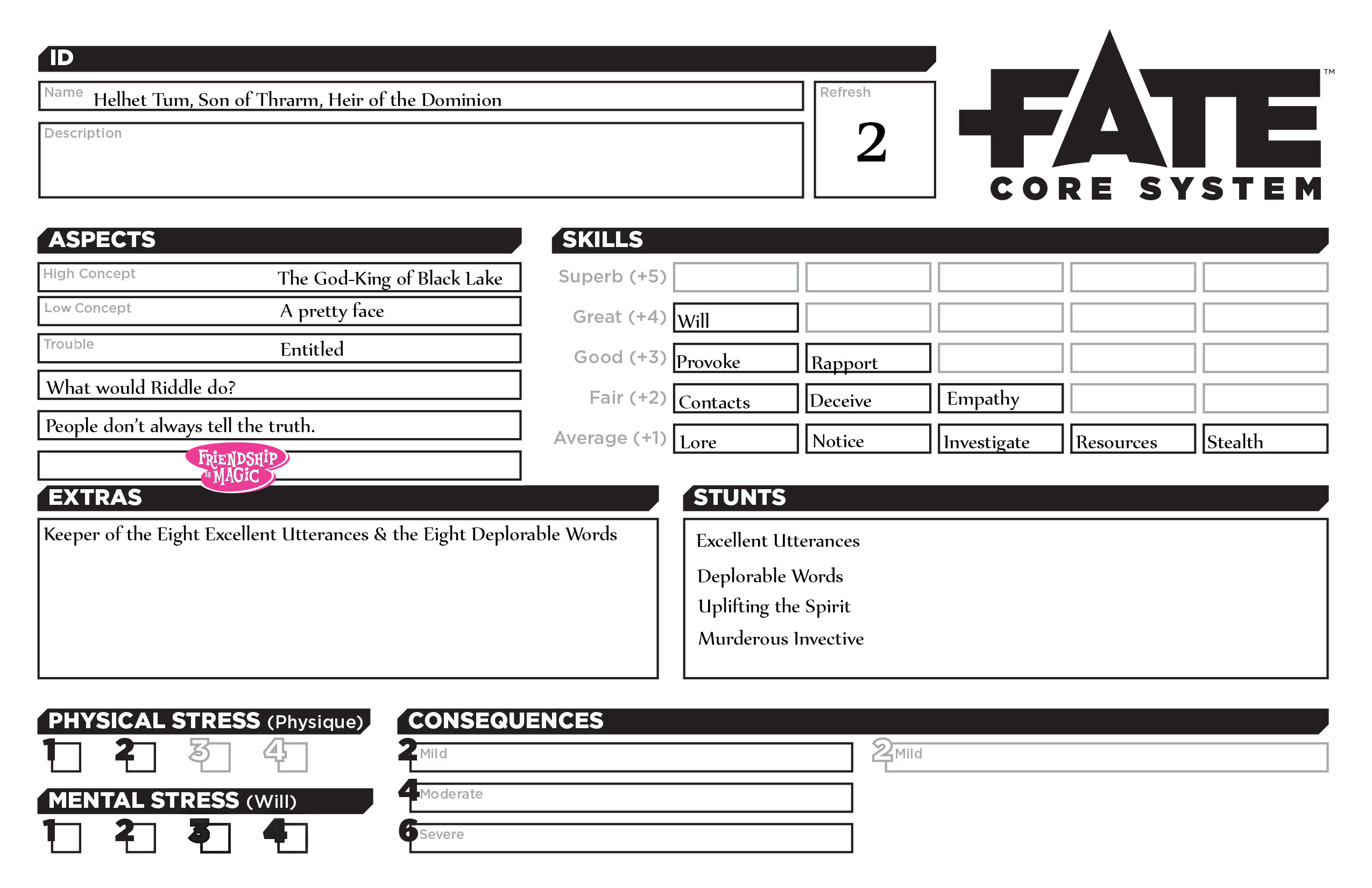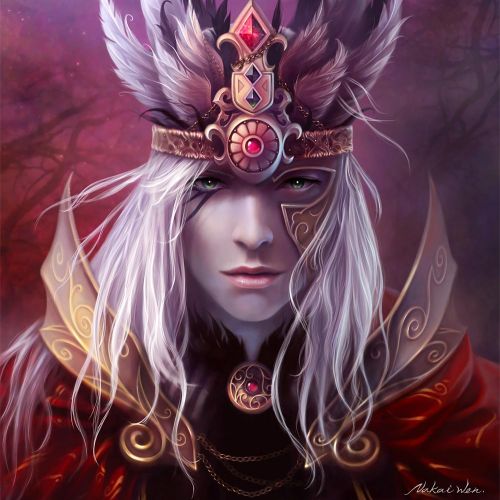Difference between revisions of "Helhet"
| Line 24: | Line 24: | ||
Then one day. The God-King vanished. | Then one day. The God-King vanished. | ||
| − | http://oakthorne.net/wiki/images/ | + | http://oakthorne.net/wiki/images/Helhet.jpg |
'''The God-King of Black Lake''' | '''The God-King of Black Lake''' | ||
Revision as of 23:58, 13 July 2013
WORK IN PROGRESS
"If evil is inevitable, how are the wicked accountable? Nay, why do we call men wicked at all? Evil is inevitable, but is also remediable." - Horace Mann
Helhet Tum, Son of Thrarm, Heir of the Dominion
Following the great war between the Kingdom of Black Lake and the Autumn Tribes of Nur, the old gods of the Dominion had grown weak, having expended far too much of their power during the long war. The gods chose their champions, King Thrarm and his consort, the Seer Alfane, to facilitate their rebirth. So the time of the Dominion gods did pass, their divine essence coalescing and uniting to be reincarnated in the birth of Thrarm and Alfane's son, Prince Helhet Tum.
As the son of Thrarm, Helhet Tum was taught the secrets of the Eight Excellent Utterances. As the son of the Seer Alfane, he was taught the Eight Deplorable Words. They had been named Keepers and charged by the gods to safeguard these great and terrible powers and were only ever to use them when enacting the will of the Dominion.
Thrarm's fate is not clear, but at an early age, Helhet Tum was inaugurated as the God-King of Black Lake and recognized as the Heir of the Dominion and his mother recognized as his Vizier. God-King Helhet Tum used the powers of the Dominion to reshape men to be what they needed to be to better serve him and the realm. He found a freedom in the use of the sixteen powers that none of the keepers before him had, for he was the will of the Dominion, and any use he made of the Utterances or Words, was thus not only justified, but divinely ordained, for his will was the will of the gods of the Dominion.
The people of Black Lake were joyous and praised the great might of their living god. For many this praise was genuine, but for some it because their will had already been taken from them. Black Lake would grow into a military giant. They pushed the Nur invaders back into their mountains. They conquered the green vales of Hanar and the Commonwealth of Sendar and they outright annihilated the strange folk of the nameless hills to the south.
The Kingdom of Black Lake had risen to become one of the most powerful realms in the region.
God-King Helhet Tum is said to stand nearly twice the height of a mortal man and possess the impossible beauty of the gods. He wields his fathers fabled spear, the Radiance of Dawn, as the symbol of his authority.
Then one day. The God-King vanished.

The God-King of Black Lake
- Low Concept: A pretty face
- Trouble: Accountable to none
- Aspects:
- 1) Get your hands dirty & do it yourself
- 2) Mundane words can have a power of their own
- 3) Allies are better than pawns
- Extras: Keeper of the Eight Excellent Utterances & the Eight Deplorable Words
- Skills
- Great (+4): Will
- Good (+3): Provoke, Rapport
- Fair (+2): Contacts, Deceive, Resources
- Average (+1): Lore, Notice, Investigate, Empathy
- Stress
- Physical 2
- Mental 4
Excellent Utterances (1 stunt) New Action: Helhet can directly affect the virtuous emotions of those he speaks to, either empowering them or muting them. (Mechanically, this is a specialization of the Create an Advantage action for Report.) This can be used either to evoke (or supress) one of the eight virtues generally or to sharpen that virtue toward (or away) from a specific person, place, thing, or idea. The target must be listening to Helhet, and Helhet must be verbally communicating with that person. Unless the use of this power runs fairly counter to the natural inclinations of the target, he or she will probably not notice that this power is being used. However, if the target is particularly sensitive or has reason to suspect that Helhet might be manipulating their emotions, they can use Empathy to Defend against this action.
Deplorable Words (1 stunt) New Action: Helhet can directly affect the base emotions of those he speaks to, either inflaming them or dulling them. (Mechanically, this is a specialization of the Create an Advantage action for Provoke.) This can be used either to evoke (or supress) one of the eight vices generally or to sharpen that vice toward (or away) from a specific person, place, thing, or idea. The target must be listening to Helhet, and Helhet must be verbally communicating with that person. Unless the use of this power runs fairly counter to the natural inclinations of the target, he or she will probably not notice that this power is being used. However, if the target is particularly sensitive or has reason to suspect that Helhet might be manipulating their emotions, they can use Will to Defend against this action.
The Eight Excellent Utterances and The Eight Deplorable Words
The Eight Excellent Utterances
- Compassion is nonjudgmental empathy for one's fellow creatures.
- Honesty is scrupulous respect for truth - the willingness never to deceive oneself or another.
- Honor is the courage to stand for the truth, against any odds.
- Humility is perceiving one's place in the world, not according to one's own accomplishments, but according to the intrinsic value of all individuals.
- Justice is the devotion to truth, tempered by love.
- Sacrifice is the courage to give of oneself in the name of love.
- Spirituality is the concern with one's inner being and how one deals with truth, love, and courage.
- Valor is the courage to take actions in support of one's convictions
The Eight Deplorable Words
- Despise: The Spiteful soul has often been severely emotionally scarred, leading to an intense hatred for all life, and an urge to exact vengeance upon anything breathing. They revel in the torment of others.
- Deceit: The Deceitful soul uses logic and quick thinking to decieve others for personal gain. A seasoned swindler can profit considerably from his skill, and often has an extraordinary ability to avoid capture or discovery.
- Shame: The Shameful soul can never be trusted, for it will committ treason for personal gain. It will pretend to be a friend, but what it truly wants is information, profit, a strong ally or other personal gain. When its friendship is put to the test, it will abandon you.
- Pride: The Proud soul considers itself to be superior to other living beings. It will disregard others' opinions, thinking that it, alone, is capable of valid reasoning. The symptoms of Pride include arrogance, intolerance and egocentricity.
- Wrong: The Wrongful never cares about right or wrong. If acting upon the orders of others, they will follow these orders blindly and stop at nothing to get the job done. If acting out their own interests, they will tend to pursue the greatest good for themselves or their closest allies with no regard for the consequences of others.
- Covetous: The Covetous soul will never give up anything that belongs to it, no matter how desperate the call might be. It is driven by an intense urge for material profit and will sacrifice the interests of others to please this urge. Unlike Sacrifice, the Virtue which stands for self-Sacrifice, Covetous represents the sacrificing of others for personal gain.
- Hyloth: The Hylotheistic soul does not believe in, nor care about the spirit. It believes that only matter exists and matters. For such a soul, there is no reason to ever pursue any higher ideal than personal gain, material security or sensual pleasure. The hylotheist often acts like a devout believer of its own religious school and may try to sway others to their belief. Hylotheism is closely related to and often leads to cynicism.
- Dastard: The Dastardly soul never dares to stand up for its beliefs, and it will not do anything that anyone may disagree with, out of fear for the consequences. When noone is around to see them, however, their true nature, whatever that may be, is revealed.
